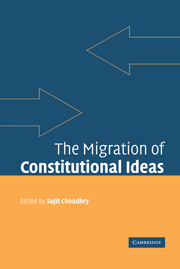Book contents
- Frontmatter
- Contents
- List of contributors
- Acknowledgements
- 1 Migration as a new metaphor in comparative constitutional law
- PART I The methodology of comparativism
- PART II Convergence toward a liberal democratic model?
- PART III Comparative constitutional law, international law and transnational governance
- PART IV Comparative constitutional law in action – constitutionalism post 9/11
- 13 The migration of anti-constitutional ideas: the post-9/11 globalization of public law and the international state of emergency
- 14 The post-9/11 migration of Britain's Terrorism Act 2000
- 15 ‘Control systems’ and the migration of anomalies
- Index
14 - The post-9/11 migration of Britain's Terrorism Act 2000
Published online by Cambridge University Press: 25 July 2009
- Frontmatter
- Contents
- List of contributors
- Acknowledgements
- 1 Migration as a new metaphor in comparative constitutional law
- PART I The methodology of comparativism
- PART II Convergence toward a liberal democratic model?
- PART III Comparative constitutional law, international law and transnational governance
- PART IV Comparative constitutional law in action – constitutionalism post 9/11
- 13 The migration of anti-constitutional ideas: the post-9/11 globalization of public law and the international state of emergency
- 14 The post-9/11 migration of Britain's Terrorism Act 2000
- 15 ‘Control systems’ and the migration of anomalies
- Index
Summary
The terrorist attacks of 11 September 2001 have resulted in the expansion of anti-terrorism laws throughout the globe. The international and domestic reaction to these attacks constitute a type of horrible natural experiment in the migration of constitutional and anti-constitutional ideas. In this chapter, I will attempt to provide insight into the complexity of the migration of constitutional ideas with respect to anti-terrorism laws by examining the influence of the definition of terrorism in Britain's Terrorism Act 2000 on the post-9/11 development of anti-terrorism laws in Australia, Canada, Hong Kong, Indonesia, South Africa, and the United States, as well as the role that domestic law, politics, and history played in producing variations in the definition of terrorism in each country.
As Kim Lane Scheppele argues in her contribution to this collection, international law, and in particular the UN Security Council Resolution 1373, helped shape the worldwide expansion of anti-terrorism laws after the 9/11 terrorist attacks. At the same time, as Professor Scheppele notes, Security Resolution 1373 made no attempt to define terrorism and a universal definition of terrorism has so far eluded the international community. A failure to define terrorism in international law allowed various local agendas to enter into the definition of terrorism. Although, as Professor Scheppele suggests, the local agenda sometimes helped produce more repressive laws, at other times, it restrained the new international mandate to combat terrorism.
- Type
- Chapter
- Information
- The Migration of Constitutional Ideas , pp. 374 - 402Publisher: Cambridge University PressPrint publication year: 2007
- 5
- Cited by



